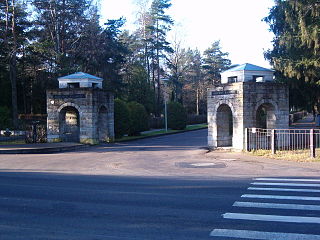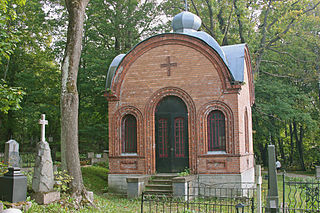
Tallinn is the capital and most populous city of Estonia. Situated on a bay in north Estonia, on the shore of the Gulf of Finland of the Baltic Sea, Tallinn has a population of about 461,000 and administratively lies in the Harju maakond (county). Tallinn is the main governmental, financial, industrial, and cultural centre of Estonia. It is located 187 km (116 mi) northwest of the country's second largest city, Tartu; however, only 80 km (50 mi) south of Helsinki, Finland, also 320 km (200 mi) west of Saint Petersburg, Russia, 300 km (190 mi) north of Riga, Latvia, and 380 km (240 mi) east of Stockholm, Sweden. From the 13th century until the first half of the 20th century, Tallinn was known in most of the world by variants of its other historical name Reval.

Harju County, is one of the fifteen counties of Estonia. It is situated in northern Estonia, on the southern coast of the Gulf of Finland, and borders Lääne-Viru County to the east, Järva County to the southeast, Rapla County to the south, and Lääne County to the southwest. The capital and largest city of Estonia, Tallinn, is situated in Harju County. Harju is the largest county in Estonia in terms of population, as almost half (45%) of Estonia's population lives in Harju County.

Meistriliiga, officially known as A. Le Coq Premium Liiga for sponsorship reasons, and commonly known as the Premium Liiga, is the highest division of the Estonian Football Association annual football championship. The league was founded in 1992, and was initially semi-professional with amateur clubs allowed to compete. With the help of solidarity mechanisms, the league is fully professional since the 2020 season.

The Hagenbund or Künstlerbund Hagen was a group of Austrian artists that formed in 1899. The group's name derived from the name Herr Hagen, the proprietor of an inn in Vienna which they frequented.

Jõgeva is a small town in Estonia with a population of around 5000 people. It is the capital of Jõgeva Parish and Jõgeva County.

The Munster Council is a provincial council of the Gaelic Athletic Association sports of hurling, Gaelic football, camogie, rounders and handball in Munster, one of the four provinces of Ireland.

Türi is a town in Järva County, Estonia. It is the administrative centre of Türi Parish. Since 2000, Türi is known as the "spring capital" of Estonia. It has a railway station on the Tallinn - Viljandi railway line operated by Elron.

Rahumäe cemetery is a cemetery located at Rahumäe in Nõmme District, Tallinn, Estonia. This municipal cemetery was established in 1903 on 29 hectares of land to meet the needs of the growing population of Tallinn. A number of congregations are present including a Jewish section established in 1911. This forested cemetery is notable for its many works by famous sculptures and chapels present within its grounds.
The Korvpalli Meistriliiga (KML), known as the PAF Korvpalli Meistriliiga for sponsorship reasons, is the top-tier men's basketball league in Estonia. The league is organized by the Estonian Basketball Association.
The Deutsches St. Leger is a Group 3 flat horse race in Germany open to thoroughbreds aged three years or older. It is run at Dortmund over a distance of 2,800 metres, and it is scheduled to take place each year in September or October.
JS Estonia Tallinn was an Estonian football club based in Tallinn. It was founded in November 1930. The board included many ex-footballers and then active players that played for the team, such as Eduard Ellmann-Eelma and Arnold Pihlak.
Anton Lembit Soans was an Estonian architect, urban planner and lecturer. He was one of the founding members of the Estonian Architects Union.

Alexander Nevsky Cemetery is a cemetery in the Juhkentali subdistrict of Tallinn, Estonia; it is part of Siselinna Cemetery. The cemetery is named after nearby Alexander Nevsky Cathedral.










